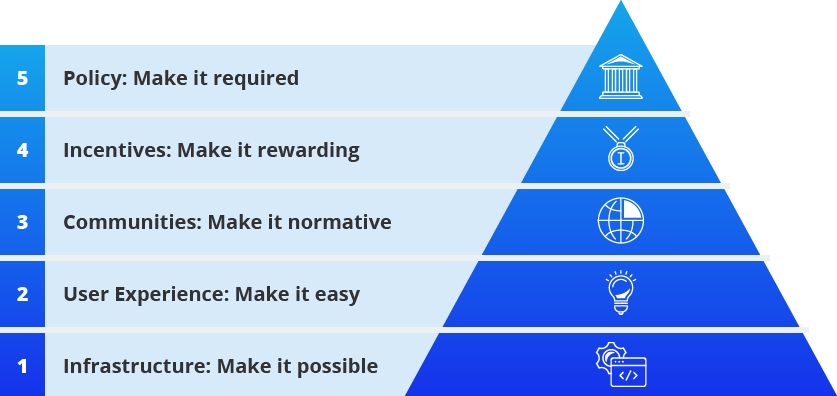Strategic change in science
The theory comes from the Center for Open Science (COS) and the reason why it is so enticing to me, is that is is quite understandable and hands-on, but at the same time feels really powerful and true.
If you want to learn more about the thinking behind this, I recommend watching the presentation from the COS 10 year anniversary by Lisa Cuevas Shaw. Thinking about Open Science in a more strategic way, really helps me figuring out where I currently stand and what types of work I do. Some examples:
The Center for Open Science does the same thing. They also clearly state what they are doing in their own work. I am hoping to share a bit more from the CERN/NASA event in an upcoming newsletter. I've got so much to tell you! Check here if you want to take a peak at recordings, slide decks, and more. The next two weeks I'll be on summer break. Hope you'll find some time to relax as well! All the best, Heidi P.S. I know that sometimes my newsletters might sound like someone is paying me for advertisement. This is not the case. I am just writing about stuff I learn about, enjoy or get excited about. |
Heidi Seibold, MUCBOOK Clubhouse, Elsenheimerstr. 48, Munich, 81375 |
Dr. Heidi Seibold
All things open and reproducible data science.
I get asked for career advice all the time (even though I am just figuring stuff out myself). Generally I try to help by listening and asking questions, but there is one thing that I tell everyone who wants to hear it: pick work where you like the people. How do you pick the research group you want to work with? My recommendation is to pick based on two things: Do you like the topics they work on? Do you get along with the people in the group (in particular your boss/supervisor)? The first is...
The academic publishing system is broken. I think we can all agree on that. But what if you want to have an academic career and at the same time stick to your values of openness? Here's my pragmatic take. I understand the fear of not publishing in established journals. We all want to have a good career and feel like publishing our papers in the journals that our peers and employers deem worthy seems like an important step. As a pragmatic open scientist, I generally recommend not to be too...
Have you complained about the inefficiency of public administration before? I think, you're not alone. In this post I want to share my journey with trying to help increase efficiency through data literacy in the public sector. I am a person who likes to solve problems. Most of my time is spent solving problems in academia, but I decided to leave my usual grounds for a special project where I can help solving problems in the public sector. Why do I care about solving problems in the public...
